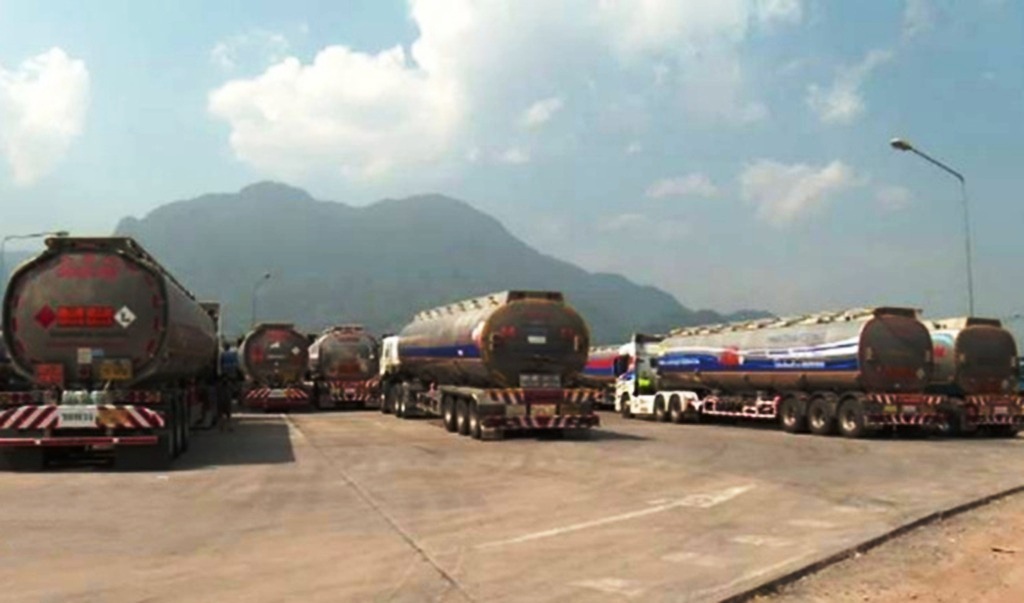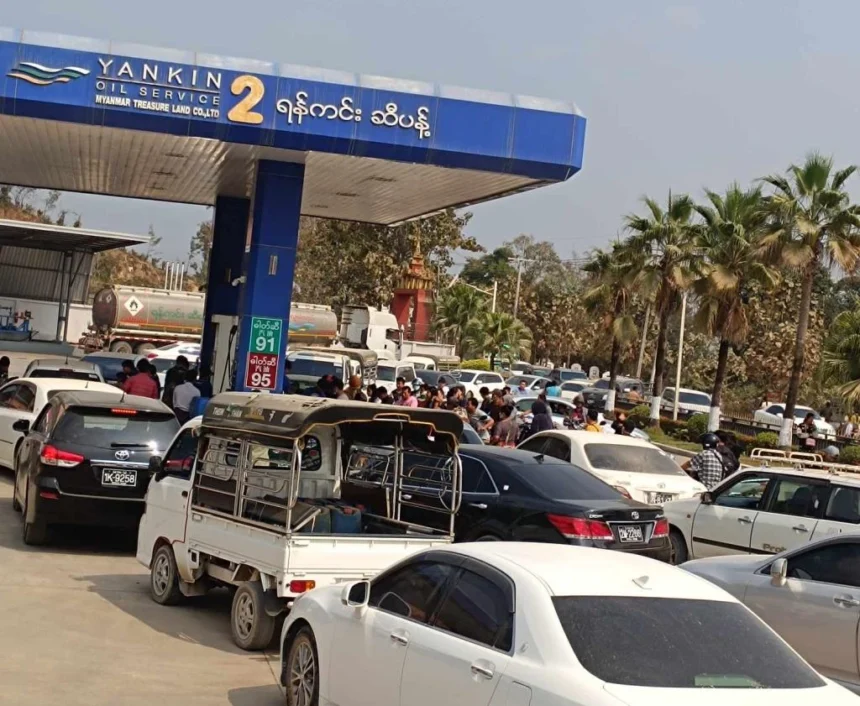Fuel prices in Tachileik, Myanmar, have surged, doubling in cost after Thailand imposed restrictions on fuel and electricity exports. The move aims to curb scam networks operating along the Thailand-Myanmar border in Mae Sai, Chiang Rai.
The restrictions have significantly reduced supply, leaving locals with higher fuel costs. This sudden spike has added strain to residents who depend on affordable fuel for their daily activities.
Despite Thursday’s power cuts, Tachileik wasn’t left completely without electricity, as power continues to flow in from Laos. Still, the fuel export ban has caused noticeable challenges for the community and local businesses.

Fuel Tankers Parked in Mae Sai
In Mae Sai District, Chiang Rai Province, dozens of oil tankers remain parked at a Highways Department rest area, unable to cross into Tachileik. Many drivers, paid per trip, have been stuck there for days, with some waiting up to three days without work. They expressed frustration and were unsure about their next steps.
In Myanmar, fuel prices have risen sharply—by 50-80 baht per liter—causing long lines at gas stations. Many stations have started limiting refuelling to vehicles only, refusing to allow customers to fill containers.
Fuel Stations Overwhelmed
One local shared how the price hike has deeply affected their lives, as many rely on fuel for work and power generators. Meanwhile, while the power cuts from Thailand haven’t left homes completely dark, some villagers are buying generators as a precaution.
Sources in Tachileik revealed that, previously, about 75% of the city’s electricity came from Thailand, with a monthly value of approximately 40 million baht, while the remaining 25% came from Laos.
However, recent efforts by Thailand to crack down on call centre gangs have led Myanmar to shift its electricity supply. Over the past few months, about 70% of Tachileik’s electricity now comes from Laos via the Mekong River, minimizing the impact of Thailand’s cuts.
Thailand has stopped supplying electricity and fuel to border areas in Myanmar, targeting numerous scam centers operating in the region.
Deputy Prime Minister and Interior Minister Anutin Charnvirakul led the decision. He explained the power supply was cut because it was being misused in ways that disrupted Thailand and posed security risks. The fuel supply was also halted to pressure the Myanmar government into taking action against these fraudulent operations.
“While they might struggle with limited power, Thailand can no longer be seen as supporting illegal activities,” said Anutin. “They may seek alternative power sources or generate their own electricity.”

Myanmar Businesses Buying Generators
A resident of Tachileik shared that local residents experienced power outages starting Wednesday morning. Meanwhile, Chinese-owned businesses, including scam centers, switched to using generators.
“In the past two days, large generators have arrived in town. Now, these generators are running, and scam centers are still operating,” the resident told Reuters, requesting anonymity due to the sensitive nature of the situation. “Meanwhile, businesses owned by locals have shut down, leaving people here in trouble.”
Scam operations in Southeast Asia, particularly along the Thai-Myanmar border, are believed to have forced hundreds of thousands into illegal online activities, generating billions of dollars annually, according to a 2023 United Nations report.
Thailand was pushed to take this strong stance after repeated requests from China to cut off resources to the criminal groups exploiting Chinese citizens.
Related News:
Thailand and China Crack Down on Scam Call Centers in Myanmar

Geoff Thomas is an award winning journalist known for his sharp insights and no-nonsense reporting style. Over the years he has worked for Reuters and the Canadian Press covering everything from political scandals to human interest stories. He brings a clear and direct approach to his work.














